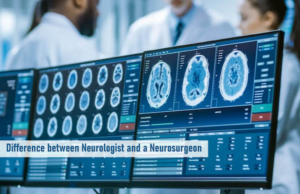Difference between Neurologist and a Neurosurgeon

"Neurologist" and "neurosurgeon" are sometimes used interchangeably when discussing brain and nervous system issues. However, despite some similarities, there are considerable differences between these two medical specialists. For example, the American Board of Neurological Surgery estimates that only 20% of patients with neurological conditions need surgical treatment, meaning that a neurologist can manage most cases.
Knowing these distinctions is essential in deciding which specialist to consult when looking for medical care for neurological disorders. In this blog, we will examine the difference between a neurologist and a neurosurgeon to assist you in making a wise healthcare decision.
What Differs a Neurologist from a Neurosurgeon?
Neurologists and neurosurgeons play critical roles in diagnosing and treating various neurological disorders. Here are a few main differences between these two that help the patients choose the best specialists.
Academic Background
Both neurologists and neurosurgeons have medical degrees and have finished residency programs in their respective fields of specialization. However, neurosurgeons require extra specialized training in surgical procedures for neurological problems. This includes a fellowship program, which could continue for a year or two. They receive hands-on experience diagnosing, managing, and treating complex neurological diseases that call for surgical procedures during this period.
Treatment Focus
Neurologists concentrate on identifying and treating neurological conditions without surgery, such as through medication, treatment, and dietary modifications. They specialize in treating diseases like epilepsy, multiple sclerosis, Parkinson's disease, Alzheimer's disease, and others. On the other hand, neurosurgeons concentrate on surgical treatments for neurological problem, including brain and spinal shunting, kyphosis, malformation decompression, etc. They have received training in various treatments, including removing brain and spinal tumors, deep brain stimulation surgery, and installing shunts for hydrocephalus.
Spinal and brain tumor surgery
The surgical removal of brain and spinal tumors is a specialty practiced by neurosurgeons. They collaborate closely with neurologists, who use non-surgical techniques, including chemotherapy and radiation therapy, to identify and cure tumors. In addition, a neurologist may occasionally recommend a patient to a neurosurgeon for tumor removal surgery.
Treatment for Stroke
The treatment of stroke, a medical emergency brought on by the blockage or rupture of a blood artery in the brain, is a specialty of neurologists. They have received training in stroke diagnosis and non-surgical treatment options, such as medication. Surgery to remove blood clots or heal stroke damage may be done by neurosurgeons.
Surgery for Brain and Spine Injuries
Neurosurgeons are experts in using surgical procedures to treat severe brain and spine injuries. They collaborate closely with neurologists who offer non-surgical treatments, including medication and therapy for recovery. Traumatic brain and spinal injuries can be treated by neurosurgeons using techniques like decompression surgery, spinal fusion, and craniotomies.
Motion Disorders
The diagnosis and management of movement disorders such as Parkinson's disease, essential tremor, and dystonia are areas of expertise for neurologists. To treat these disorders, they employ non-surgical therapies like medicine and therapy. Deep brain stimulation surgery is occasionally used by neurosurgeons to address movement abnormalities that do not improve with non-surgical treatments.
Epilepsy Treatment
Epilepsy is a neurological condition marked by recurring seizures, and neurologists are experts in treating it. To address the illness, they employ medication and other non-surgical procedures. In addition, neurosurgeons may occasionally do surgery to remove areas of the brain that are generating seizures that cannot be controlled by drug therapy or other non-surgical treatments.
Outpatient Care vs. Inpatient Care
Surgery by neurosurgeons frequently necessitates hospitalization. This implies that the patient might have to spend some time in the hospital following the procedure. On the other hand, neurologists may offer outpatient care for many neurological illnesses, allowing the patient to leave on the same day.
Continuous Care
Regular check-ups, medication adjustments, and other non-surgical interventions are just a few of the continuous care and management options that neurologists may offer for neurological conditions. After surgical procedures, neurosurgeons may refer patients back to a neurologist for follow-up care. In addition, they might occasionally collaborate to give a patient comprehensive care.
Patient Population
From young children to the elderly, neurologists treat a wide variety of patients with neurological problems. Additionally, they might see patients with persisting chronic diseases. Patients who need surgical procedures for severe neurological problems, such as brain and spinal tumors or traumatic brain injuries, are typically seen by neurosurgeons. Additionally, they might see patients requiring urgent surgical care or not responding to non-surgical interventions.
Working Together With Other Medical Specialists
Although they frequently cooperate with many healthcare providers, neurologists and neurosurgeons work closely with other medical specialists. While neurosurgeons collaborate extensively with anesthesiologists, radiologists, and other surgical specialists, neurologists frequently work closely with general practitioners, psychiatrists, and other specialists.
Final Thoughts
Despite having similar educational backgrounds and emphasizing treating neurological problems, neurologists and neurosurgeons differ significantly in their specialties and care methods. Nevertheless, both specialties are essential to provide patients with neurological illnesses with complete care.
FAQs
When should I consult a neurologist?
If you have signs of a neurological disease, such as headaches, seizures, or problems with movement or coordination, you should consult a neurologist. In addition, there may be a need for a referral from your primary care provider.
When should I visit a neurosurgeon?
You should consult a neurosurgeon if you have a neurological problem requiring surgery, such as a brain or spinal tumor or a severe brain injury. Getting a recommendation from your primary care doctor or a neurologist might be essential.
What are some prevalent neurological conditions?
Alzheimer's disease, Parkinson's disease, epilepsy, multiple sclerosis, and migraines are just a few examples of common neurological conditions.
What distinguishes a spinal tumor from a brain tumor?
A brain tumor is a mass or development of abnormal cells that form in the brain. A growth in or close to the spinal cord or nerve roots is called a spinal tumor. Both varieties of tumors have the potential to be malignant or benign and may call for surgical intervention.